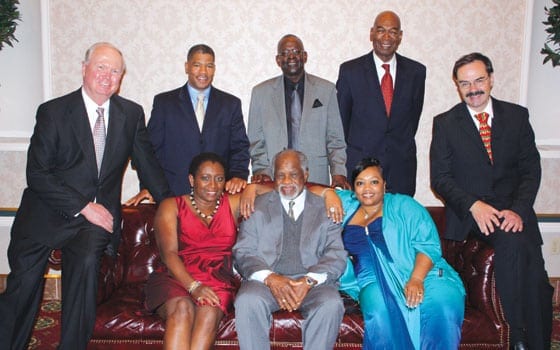

United Housing Management is achieving its goals of increasing affordable housing and creating jobs
Those were dark days in 2002, back when start-up United Housing Management LLC (UHM) purchased a significant portion of the affordable housing portfolio owned by Long Bay Management Co.
As UHM General Manager John Strodder and UHM Chief Financial Officer Otis Gates recalled, they were working in a basement with no windows and could only pray that they too would have a place of their own.
That changed in 2007 when the company bought and renovated a two-story building on Warren Street near the Charles Street AME Church in Roxbury. “That was major turning point,” Strodder said.
Indeed it was. UHM’s housing portfolio has steadily grown from about 720 units to about 1,400 and it has more than doubled its staff to 62 employees. More important, it is quietly achieving one of its primary goals — hiring minorities and contracting with minority- and women-owned firms.
“This is an organization that is committed to the economic development of the community,” Gates said. “From the beginning, we have wanted to become an economic engine.”
According to the Massachusetts Housing Finance Agency (MassHousing), UHM has far surpassed the diversity goals of the state agency and the numbers attained by larger property management companies. In recent annual reports, MassHousing analyzed the percentage of contracts awarded to minority- and women-owned businesses by property management companies running 75 of the state agency’s affordable housing in Roxbury and Dorchester.
In 2009, for instance, MassHousing estimated that about $27 million was available to pay for such contracts that range from everything from architectural services and accounting to painting and building maintenance. The agency has set a diversity goal of 50 percent.
In 2009, UHM hired 69.9 percent MBEs and 27.6 WBEs. In 2010, those numbers were 74.7 percent MBEs and 28.7 WBEs.
On average, MassHousing reported, the overall average in 2009 was 43 percent for MBEs and 20.2 percent for WBEs. A few companies were substantially lower. Winn Residential hired 32 percent MBEs and 18.7 WBEs. Last year, at 43.2 percent MBEs and 20.5 percent WBEs, Winn improved, but still fell short of MassHousing goals.
Both Strodder and Gates estimate that if other property management companies matched UHM numbers, an additional $7 million would have gone to minority- and women-owned firms — and would have helped create as many as 550 new jobs.
“Most of these properties are owned by nonprofits and community development corporations,” Gates explained. “Even though they are required to have local people on their governing boards, they don’t recognize the importance of economic development and creating jobs. It’s a priority for us.”
That priority starts within UHM. Of its eight owners, all of whom work at the company, six are minorities. Ninety-one percent of all UHM employees are minorities and 63 percent live in Boston. “All of us have a real stake in the success of our company,” Gates said.
Their primary goal is to grow as a property management company by increasing their affordable housing portfolio throughout the city and state and possibly competing in the commercial property market.
As it is now, their portfolio includes such properties as the Blue Mountain Apartments in Dorchester and the VBC Apartments on Blue Hill Avenue in Boston. They also manage the 36 duplex homes in Roxbury called the Brook Avenue Cooperative and the 26 units in the Highland Park development owned by the Boston Housing Authority.
Affordable housing is clearly their niche, and each of their owners has a wealth of experience in the field.
Strodder is just one example. A 1979 graduate of University of Massachusetts, Strodder began his career in housing management with the National Corporation Housing Partnership. He joined Long Bay Management in 1987 as director of operations. By 1996, he was general manager overseeing a portfolio of 1,400 units and 100,000 square feet of commercial and retail space.
Gates is another. A graduate of both Harvard and Harvard Business School, Gates grew up in Roxbury and began his financial management career with Arthur Andersen consulting, becoming a partner in 1976. His first work as a real estate developer began in the 1980s when he developed Concord Place, a 55,000 square foot historic office and retail space in downtown Framingham.
Their work is difficult and goes way beyond the collection of rent. The paperwork alone is tedious and includes never-ending filings with the Internal Revenue Service, MassHousing, and various other state and city agencies. Security is an on-going issue; as is building maintenance. To meet those needs, UHM has 22 people on staff to answer service calls at any time.
“We are committed to making sure that all of our buildings are safe, secure and properly maintained,” Gates said.
They are also focused on the tenants. According to Strodder and Gates, they try to include residents in a “meaningful way” in all property management decisions and stress individual responsibility to insure “ a sense of community.”






